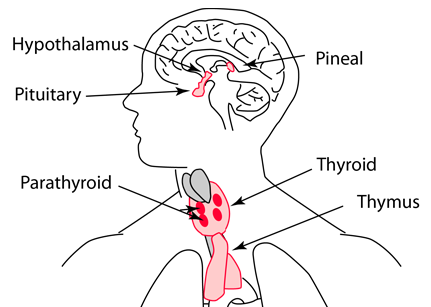Pituitary Gland
 | The pituitary gland is a gland of the endocrine system which is about the size of a pea and extends off the bottom of the hypothalamus in a central location in the brain. "Hormones secreted from the pituitary gland help to control growth, blood pressure, energy management, all functions of the sex organs, thyroid glands and metabolism as well as some aspects of pregnancy, childbirth, breastfeeding, water/salt concentration at the kidneys, temperature regulation and pain relief." |
The pituitary gland consists of two distinct lobes called the anterior and posterior pituitary. Both of them are regulated by the hypothalamus. The anterior pituitary produces hormones used in the reproductive process. It produces Follicle-stimulating hormone (FSH) and lutinizing hormone (LH) which stimulate production of sperm and testosterone in males and of eggs, estrogen, and progesterone in females.
The anterior pituitary gland interacts with the thyroid by producing the thyroid-stimulating hormone (TSH) which stimulates the thyroid to release its hormones.
The anterior pituitary gland also interacts with the adrenal gland by producing the adrenocorticotropic hormone (ACTH) to cause it to release its hormones.
The anterior pituitary gland also produces some hormones that do not interact with other endocrine glands:
- Prolactin helps stimulate the development of the mammary glands during pregnancy. These glands are classified as exocrine glands.
- Endorphins inhibit the perception of pain by binding to certain receptors in the brain.
- Melanocyte-stimulating hormone (MSH) stimulates the synthesis of the skin pigment melanin.
- Growth hormone acts on all the body's cells, regulating the body's growth.
- Increases protein synthesis, fat utilization, and the storage of carbohydrates
- Stimulates bone growth during maturation
- Produces much of the normal variation in size of adult
- Deficiency in production of the hormone leads to dwarfism, excess leads to gigantism.
- Lifelong secretion helps to regulate metabolism of protein, fat and sugar.
The posterior pituitary acts in concert with the hypothalamus to release two peptide hormones that are synthesized in the hypothalamus. These two hormones are transported to the pituitary where they are transferred to capillary beds and travel in the bloodstream to their destinations. The antidiuretic hormone (ADH) increases the permeability to water of the collecting ducts of the nephrons of the kidney, causing water to be reabsorbed from the urine and retained in the body. This process acts as a negative feedback loop to control the content of water in the blood.
The hormone oxytocin, synthesized in the hypothalamus and distributed in the blood by the pituitary, aids in lactation by nursing mothers by causing muscles in the breast to contract. This ejects milk from the saclike milk glands into the nipples. Oxytocin also causes contraction of the muscles of the uterus during childbirth. Oxytocin may also affect male reproductive behavior by causing contraction of the sperm-carrying tubes, as observed in several animal species.
| Pituitary Gland Wiki |
| This material is part of a brief overview of the topics studied in biology with the intent to highlight the connections to basic ideas in physics and physical science. |
Reference
Audesirk & Audesirk
Ch 32
Thibodeau & Patton
Ch 16
| HyperPhysics***** Biology | R Nave |